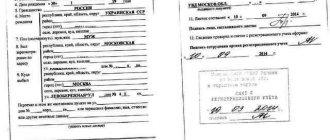Buying an apartment on the secondary market can be extremely profitable, but there are certain nuances. Imagine the transaction has been successfully completed and you want to move into your new home as soon as possible. To do this, the former owner must vacate the premises. We'll tell you how much time he has for this and what to do if the seller doesn't move out for some reason.
What to look for
The seller of the property must vacate the apartment, as soon as signatures are placed on the agreement and full payment is transferred.
The legislation contains such a concept as reasonable terms for vacating an apartment - vacating an apartment when specifying periods, which is not specified in any of the documents; however, in practice, it is considered that the duration of such a period for vacating an apartment after the sale is one month.
According to judicial practice, a reasonable period is 30 days, and only after that can legal pressure be applied to the previous tenants. But until this moment, first of all, the period is allotted for the citizens to move out of the apartment you bought, specified in the sales contract. This is stated in Art. 457 Civil Code of the Russian Federation. And if this period is not specified, it is considered that you need to leave the apartment within this reasonable period.
When carrying out such a transaction, there must be a document such as a pre-sale act, which stipulates the sequence of actions taken. It includes two parts:
- Sequence of legal actions: on the day of signing the agreement concluded between the parties to the transaction, the buyer transfers the amount of money established by the terms of the agreement and deed. Most often, this is half of the total amount, but in general this is specified in the contractual terms.
As soon as a reasonable period ends, the buyer pays the second part of the payment, and also checks all the information from the meters. This is the moment the transaction ends. The seller must check out of the living space, and other citizens registered at this address do the same. The buyer, based on the transfer act, re-registers all utility bills in his name.
- Sequence of household actions: the state of the living space in which it is located at the time of the operation, the presence and condition of existing household appliances and furniture must be described in detail and point by point.
This act has equal legal force, the same as the purchase and sale agreement, it is proof of the fidelity and compliance of the actions taken with state legislation. Therefore, the presence of furniture does not have to be specified in the main agreement.
In practice, there are 2 options - if they live in the apartment and if it is free. In the first case, the seller, having received money for the apartment, is obliged to immediately begin moving. A month is given for this.
This is a reasonable period. He assumes that the former owner is using the proceeds to buy another living space and needs a month to move.
The second option is simpler. When the apartment is already free of tenants and furniture, there is no point in the seller delaying the vacancy for a month. And the new owner can begin to use the living space immediately after the conclusion of the contract.
These points should be discussed before signing documents and included in the contract.
Useful video about the statement after the sale, what you need to know when making a transaction.
Payment of personal income tax after the sale of real estate: main points
Sellers pay personal income tax on profits from the sale of housing at a fixed rate.
The tax system for residents and non-residents of the Russian Federation is different. The rate for residents is 13%, and for non-residents – 30%.
Since 2021, new changes to the Tax Code of the Russian Federation have come into force.
Now, according to Federal Law No. 424-FZ, non-residents selling property in Russia may not pay part of the proceeds to the state. To do this, certain conditions must be met, but the ability to save 30% of the income from the transaction was a pleasant innovation.
Amendments to Article 2 of Federal Law No. 424-FZ determine that a non-resident is exempt from paying personal income tax when selling property if it was owned for more than the minimum period.
The sale of an apartment is not subject to tax if ownership was retained for 3 years for real estate purchased before 2021 and 5 years for housing purchased after January 1, 2021.
Accordingly, if the apartment belonged to a person who is not subject to taxes under Russian law for 3 years or more, and the property was registered before the beginning of 2021, the transaction will not be taxed.
The cadastral value is the price of an apartment established by the state as a result of housing assessment. You can find out the cadastral value of real estate in an open database online. To do this, you will need to enter the cadastral number or address of the property on the Rosreestr website.
When selling an apartment purchased after 01/01/2016, it is necessary to take into account its cadastral value. The sales price under the contract and the cadastral value are compared, and tax is paid on the higher of them.
When, under the terms of the alienation agreement, the sales value is indicated as more than 70% of the cadastral value, the tax is calculated at the taxpayer’s discretion:
- The sale price under the contract, taking into account a property deduction of 1 million rubles, if it was not used.
- The sales price under the contract minus the amount of documented expenses associated with the acquisition of this property.
Some people wonder how income tax is paid if the apartment has been owned for less than 3 years.
Having received income from the sale of real estate, the period of ownership of which was less than the minimum tax-free period, you must:
- Fill out the 3-NDFL declaration and submit it to the tax authority. It must calculate taxable income and indicate the tax that must be paid.
- Pay tax on income from the sale of property that has been owned for less than 3 years, unless it is fully covered by deductions and a complete exemption from personal income tax follows.
Now you know how to pay tax on real estate that has been owned for less than 3 years. We also note that after the sale of property in accordance with the Tax Code of the Russian Federation, a resident can reduce the amount of tax, down to zero. To do this, he needs to use one of the types of tax deductions.
It is possible to reduce the tax to zero if the amount of purchase and sale of an apartment, taking into account the tax deduction, is equal, and at the same time it exceeds or corresponds to 70% of the cadastral value of the property.
We recommend reading:
Sources
- Timofey, Nikolaevich Radko Theory of state and law in schemes and definitions / Timofey Nikolaevich Radko. - M.: Prospekt, 1981. - 403 p.
- Khmelnitsky, Nikolay Abridged monument of Russian legislation / Nikolay Khmelnitsky. - Moscow: Gostekhizdat, 1980. - 305 p.
- White, Jana Strategic Real Estate Portfolio Planning / Jana White. - M.: Publishing solutions, 1977. - 913 p.
- Criminal procedural legislation of the Russian Federation 2001-2011 / Team of authors. - M.: Prospekt, 2021. - 847 p.
- Fedotova, E. V. Legal psychology. Cheat sheet / E.V. Fedotova. - M.: Scientific book, 2009. - 673 p.
About deadlines
As already mentioned, when it comes to the temporary relationship, an unspoken monthly period for the seller to leave the sold property is established. The law does not stipulate from what moment it is considered, therefore, in order not to make various guesses, you can immediately indicate the period of departure in the contract for the purchase and sale of a real estate property, i.e. “I’m buying a house, live in it for a while, then move out.”
If a month has passed since the end of the operation, and the living space has not been vacated, the buyer has every right to appeal to the judicial authorities to evict the former owners of the property.
Important! The regulatory documentation does not indicate specific deadlines, so you need to know about this when purchasing a real estate property. It is important that these points are agreed upon between the parties to the transaction and are also reflected in the agreement.
It is very important to specify the terms and circumstances under which the move out of the apartment will be carried out. This is included in the majority of sales contracts. This gives some hope that entry will be carried out as you wanted and there will be no conflicts. It also gives specific deadlines for when the former owner must move out of the apartment, after which you can legally demand eviction.
The next point is also effective. The agreement can indicate that some portion of the total cost of the living space, for example, ten percent, will be placed in a safe deposit box. This money will be received by the seller only when he checks out of the property and releases it from all things not specified in the agreement.
How to secure yourself financially
In addition, the document can also prescribe penalties - for the day of delay, a certain percentage of the funds that need to be paid “flows in”. After the seller provides an extract from the new residential address or a passport in which there will be a registration stamp, he receives the reserved money. Such strict conditions force sellers to comply with the law and not irritate other parties to the transaction.
For the month that the former tenant lives in the apartment, he can pay, for example, on the basis of a rental agreement. If he does not move out in a month, this will be an additional basis for collecting lost benefits from him. In court, you can recover the amount lost from renting.
This practice is a common occurrence in real estate companies: the agency employee receives his salary when the transaction is completed, when the buyer has, in fact, received the housing and transferred money for it.
Watch the video about how not to make mistakes when buying a new apartment!
Is it possible to move in immediately after purchase?
Yes, of course, you can move into the new apartment you bought immediately after purchase. This can be negotiated with the seller. Most often, it is better to buy an apartment when the previous tenant has already been discharged and the housing is ready for new occupancy. You simply pay money for the purchase of living space and can immediately move into the apartment.
It will be good when the seller already has a new apartment. In this case, there will be no doubt that he will still live in the apartment you bought and look for a new one. Therefore, it would be more prudent to find an apartment for purchase for the seller and check out, and then sell your own. Otherwise, conflict and unpleasant situations may arise.
What to do if the former owner does not want to move out of the apartment
There are cases when the deadlines have already passed, but the seller refuses to move out of the apartment for various reasons. In this case, a conflict situation arises because the previous owner does not allow the buyer to move into the new apartment. And this causes a number of problems for the citizen who purchased this housing.
If such a situation arises and the former tenant does not want to physically leave the apartment or legally check out, then the new owner has the right to call the police. The territory no longer belongs to the previous owner of the property, so law enforcement agencies have every reason to expel a conflicting citizen.
When the terms are not fixed in the contract, the new owner can demand the eviction of the previous owner from the very first day, since the buyer becomes the owner of the property with full right. Most often, the buyer and seller agree on the deadline.
However, it is also worth knowing that the registration of the right took place without the previous owner being discharged from the property and he does not want to move out, then it will be possible to remove it from the registration register only through the court of the Russian Federation.
Sample preliminary agreement
As you can see, clause 3.4 specifies the period when the former owner will hand over the apartment to the buyer for complete disposal. And also this is the fact that the seller should not be registered there and no longer live there.
What to do if the former owner does not move out
The seller may delay moving out of the apartment for various reasons. For example, he had difficulties purchasing a new home. The situation is being resolved in several stages, which will take quite a lot of time. First, you need to send the seller a formal eviction notice. It must contain the following information:
- The legal owner of the sold property is the buyer;
- Evidence of ownership: documents certifying ownership;
- Warning about the initiation of legal proceedings.
The notice should be sent against signature or by registered mail no earlier than seven days after receiving the rights to the property. If you want to file a lawsuit, you can do this no earlier than a month after sending the notice. By law, the former owner is given the opportunity to respond to the warning and move out of the premises. If this does not happen, you can file a lawsuit. It should indicate the requirements for vacating housing. The application is submitted to the district or city court at the location of your new apartment. Attached to it:
- A complete package of documents collected during the conclusion of the transaction;
- Proof of service or dispatch of the notice;
- Confirmation that the former owner did not move out of the sold apartment;
- Receipt for payment of state duty (300 rubles).
Next, the court will oblige the executor to vacate the property. In case of repeated refusal, you should contact the bailiffs to issue an order that will allow you to forcibly evict the unscrupulous seller.
To avoid unpleasant situations and save time, we advise you to always check the property before purchasing. By ordering an extract from the EGRN from the EGRN.Reestr website , you will receive information about all owners of the apartment, its history, possible liens and encumbrances. The report will be ready in 30 minutes - 72 hours.
Text: Alina Volkova
Methods
There are four methods for releasing purchased housing from former owners:
- Best. Housing space is accepted at the same time that registration papers are submitted. From this day on, the party who bought the home is the owner, and she can live in it.
- Popular. The seller does not have time to move before the day of sale, and he is obliged to do this either within the next month by the date of registration, or a little later.
- Alternative. Used when there are several transaction objects. A person sells his home, buys from another, etc. In such a situation, the purchased living space may become available only three to four months after it was sold.
- Conflict. When a real estate seller is a drug addict, alcoholic, or simply a citizen with a difficult character, does not leave it for a long time, such a problem is solved by contacting the judicial authorities.
All issues that may then become controversial can be agreed upon with the other party to the transaction in advance in order to avoid unnecessary expenditure of nerves, time and money in the future.
If you don't check out of the apartment
Often citizens are registered at the same address, but in reality they live differently. And this situation creates many problems for homeowners. The deadline to vacate the apartment after the sale is in accordance with the law, which requires the seller to leave the apartment after the sale.
As already stated, the purchase and sale agreement must clearly explain the conditions for vacating the living space, both verbally and in writing. In the absence of partition, the law provides that the previous owner refused registration before the conclusion of the contract of sale.
Should people who sell houses be vetted? It's possible, but not necessary. Ownership is completely independent of registration. Therefore, the text of the signed agreement should play a big role. In fact, this may indicate that the owner will vacate the property by a certain date, but this may not be the case in the document.








